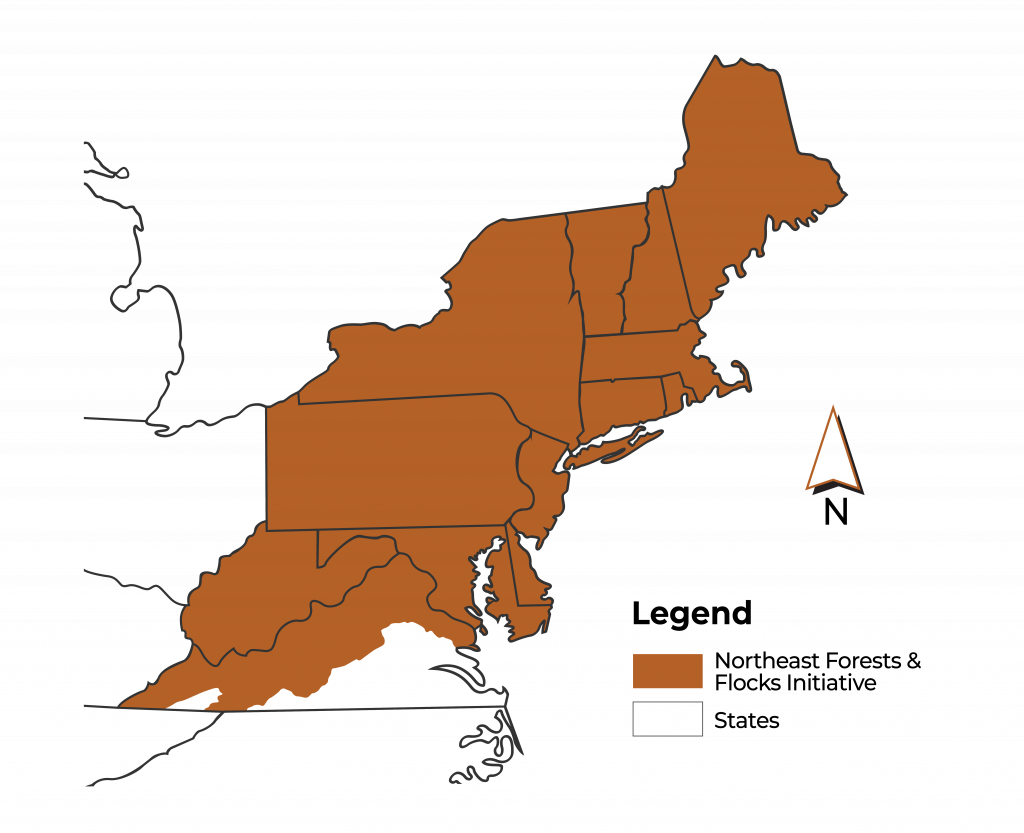NWTF Launches New Northeastern Initiative to Prevent Turkey Declines and Bolster Hunting Heritage Efforts
EDGEFIELD, S.C. — At the NWTF’s August National Board of Directors meeting, held this year in Watkins Glen, New York, NWTF conservation staff officially launched the NWTF's new Forests and Flocks Initiative, a 13-state landscape-scale effort. The new Northeastern conservation initiative will prevent future turkey declines by addressing the bird’s annual cycle needs and investing in vital research. Forests and Flocks will also bolster the NWTF’s hunting heritage and policy efforts within the region, as a lack of public support for hunting and proposed state laws in opposition with the NWTF mission are prevalent within the initiative’s area.
“The wild turkey was virtually nonexistent in the Northeast by the early 1900s, but through a monumental lift, led by agency partners, hunter-conservationists and those that revere the bird, the wild turkey population in the region is largely stable,” NWTF co-CEO Kurt Dyroff said. “Our new Forests and Flocks Initiative builds upon this incredible legacy and will work to prevent a future decline, such as what we have seen in other regions in the country. Similarly, we have seen many state-level bills proposed and passed that are in direct opposition with our mission — Forests and Flocks will energize our hunting heritage efforts in the region to ensure future generations experience the life-changing power of the outdoors.”
Besides remnant populations in parts of Maryland, Pennsylvania, Virginia and West Virginia, wild turkeys were completely extirpated [locally extinct] from the rest of the states within the region in the early 1900s (see initiative map below).

“Whether it is ensuring hens are coming out of winter in the best condition possible to help with nest success, or actively fighting the many state-level bills that are in direct opposition with our mission, Forests and Flocks captures the essence of who we are: the conservation of the wild turkey and the preservation of our hunting heritage,” NWTF co-CEO Jason Burckhalter said. “Forests and Flocks will rally our membership to address the conservation needs specific to the Northeast. We are excited to see what our volunteers and staff accomplish through this exciting new initiative.”
At the heart of the initiative is the NWTF’s dual mission to conserve the wild turkey and preserve our hunting heritage. With weather seasons being more distinct in the Northeast, ensuring the wild turkey’s annual-cycle needs are met is vital for population stability. For instance, research has indicated that hens that come out of winter in good condition are more likely to contribute during the nesting season.
Forests and Flocks will establish critical nesting habitat for turkeys in the spring, brood-rearing habitat in the summer, and deliver management practices that benefit hard and soft mast-bearing trees and shrubs that help wild turkeys make it through winter in good condition. Specifically, Forests and Flocks will work to impact 100,000 acres of public and private lands across the 13-state region through various land-management practices. Moreover, Forests and Flocks seeks to establish an additional NWTF Endowed Professorship within the initiative's region.
The initiative also focuses on the NWTF’s mission to preserve our hunting heritage. Forests and Flocks will boost the NWTF’s Education and Outreach impact within the Northeast, increase public support for hunting, and increase the Federation’s voice against recurring proposed legislation that opposes/hinders the NWTF mission.
Numerous alarming bills continue to crop up across the Northeast. For example, a recent bill in Vermont sought to dismantle the framework of the Fish and Wildlife Board by including members philosophically opposed to hunting, trapping and the North American Model of Wildlife Conservation. A similar bill in Pennsylvania sought to reallocate $150 million — funded by hunters — from the Pennsylvania Game Commission to other uses. In both instances, the NWTF, its volunteers and partners rallied to defeat these measures. As similar legislation appears across the region, Forests and Flocks brings a cohesive, heightened effort to represent the NWTF’s values.
Over the next 10 years, the NWTF estimates a need of $30 million, with partner support, by 2034 to improve over 100,000 acres of habitat on public and private lands.
About the National Wild Turkey Federation
Since 1973, the National Wild Turkey Federation has invested over half a billion dollars into wildlife conservation and has positively impacted over 23 million acres of critical wildlife habitat. The NWTF has also invested over $10 million into wild turkey research to guide the management of the wild turkey population and to ensure sustainable populations into perpetuity. The organization continues to deliver its mission by working across boundaries on a landscape scale through its Four Shared Values: clean and abundant water, healthy forests and wildlife habitat, resilient communities, and robust recreational opportunities. With the help of its dedicated members, partners and staff, the NWTF continues its work to provide Healthy Habitats. and Healthy Harvests. for future generations.
